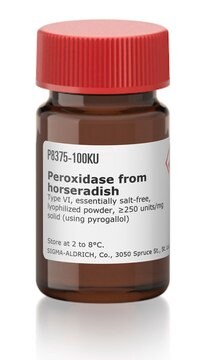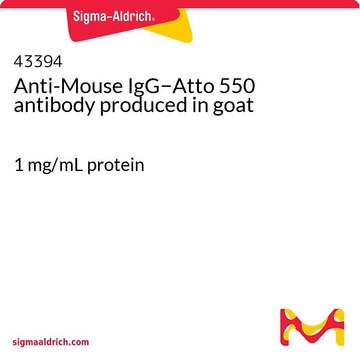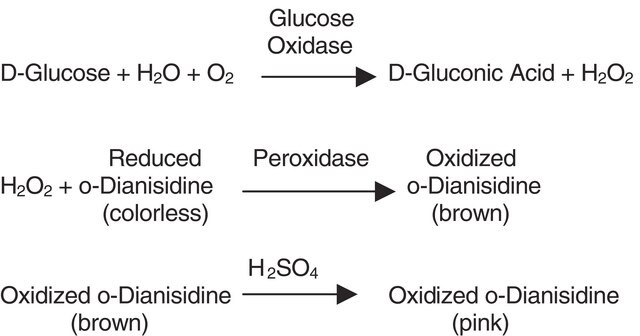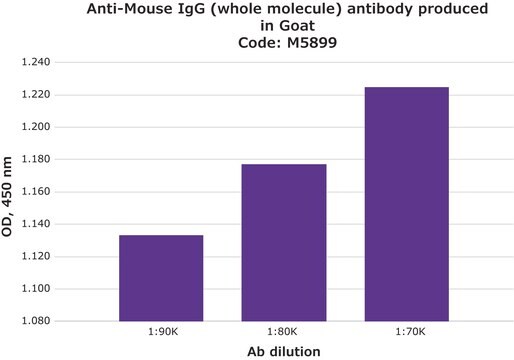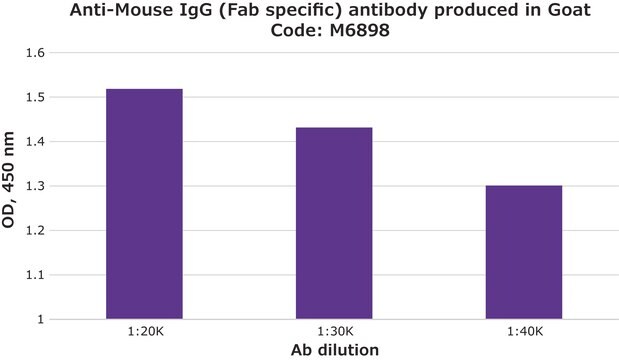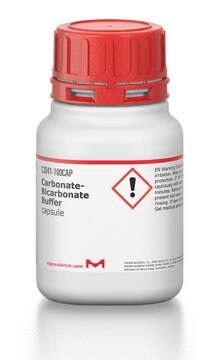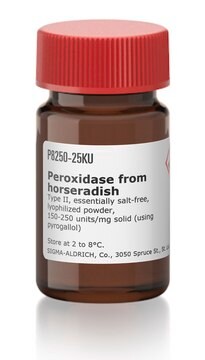M1397
Anti-Mouse IgG (γ-chain specific) antibody produced in goat
affinity isolated antibody, lyophilized powder
Sign Into View Organizational & Contract Pricing
All Photos(1)
About This Item
Recommended Products
biological source
goat
Quality Level
conjugate
unconjugated
antibody form
affinity isolated antibody
antibody product type
secondary antibodies
clone
polyclonal
form
lyophilized powder
technique(s)
Ouchterlony double diffusion: suitable
storage temp.
2-8°C
target post-translational modification
unmodified
General description
IgG antibody subtype is the most abundant serum immunoglobulins of the immune system. It is secreted by B cells and is found in blood and extracellular fluids and provides protection from infections caused by bacteria, fungi and viruses. Maternal IgG is transferred to fetus through the placenta that is vital for immune defence of the neonate against infections. Anti-Mouse IgG (γ-chain specific) antibody is specific for γ chain of mouse IgG subclasses.
Immunogen
Purified mouse IgG
Application
Anti-Mouse IgG (γ-chain specific) antibody is suitable for Ouchterlony Double Diffusion. It was used at a concentration of 0.1 μg/ml in a double antibody sandwich ELISA to measure total IgG level in mouse sera.
Physical form
Lyophilized from 0.01 M sodium phosphate, 0.015 M sodium chloride, pH 7.2.
Reconstitution
Reconstitute with 0.135 M sodium chloride.
Disclaimer
Unless otherwise stated in our catalog or other company documentation accompanying the product(s), our products are intended for research use only and are not to be used for any other purpose, which includes but is not limited to, unauthorized commercial uses, in vitro diagnostic uses, ex vivo or in vivo therapeutic uses or any type of consumption or application to humans or animals.
Not finding the right product?
Try our Product Selector Tool.
Choose from one of the most recent versions:
Already Own This Product?
Find documentation for the products that you have recently purchased in the Document Library.
H Dumortier et al.
Journal of immunology (Baltimore, Md. : 1950), 165(4), 2297-2305 (2000-08-05)
Autoantibodies directed against spliceosomal heterogeneous nuclear ribonucleoproteins (hnRNPs) are a typical feature of rheumatoid arthritis, systemic lupus erythematosus, and mixed-connective tissue disease. With the aim of investigating a potential pathogenic role of these Abs, we have studied the Ab response
Alexander Astrakhan et al.
Nature immunology, 8(5), 522-531 (2007-04-03)
The cytokine thymic stromal lymphopoietin (TSLP) drives immature B cell development in vitro and may regulate T helper type 2 responses. Here we analyzed the involvement of TSLP in B cell development in vivo with a doxycycline-inducible, keratin 5-driven transgene
Paola Favuzza et al.
Malaria journal, 15, 161-161 (2016-03-17)
The pathogenesis of malaria is primarily associated with blood-stage infection and there is strong evidence that antibodies specific for parasite blood-stage antigens can control parasitaemia. This provides a strong rationale for incorporation of asexual blood-stage antigen components into an effective
Greg A Kirchenbaum et al.
Journal of immunology research, 2017, 5874572-5874572 (2017-03-14)
The domestic ferret (
S Pauliina Turunen et al.
Innate immunity, 21(4), 370-385 (2014-08-20)
Periodontal infections increase the risk of atherosclerotic vascular disease via partly unresolved mechanisms. Of the natural IgM Abs that recognize molecular mimicry on bacterial epitopes and modified lipid and protein structures, IgM directed against oxidized low-density lipoprotein (LDL) is associated
Our team of scientists has experience in all areas of research including Life Science, Material Science, Chemical Synthesis, Chromatography, Analytical and many others.
Contact Technical Service